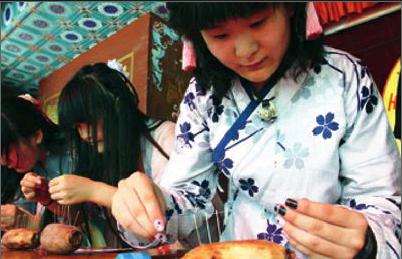Legendary Love
2014-09-15ByPanXiaoqiao
By+Pan+Xiaoqiao

On clear summer nights, looking up into a deep blue sky dotted with twinkling stars, one can easily spot the vast aquila and lyra constellations. Within them, their brightest stars—altair and vega, respectively—face each other across the Milky Way. Just as we see them shining brightly above today, more than 2,000 years ago, the Chinese storytellers of yore also looked up at these stars, and imagined that altair and vega somehow belonged together despite their separation across the infinite galaxy.
according to the legend, altair represents Niulang (cowherd), and vega symbolizes Zhinu(weaver maiden). Niulang is a poor mortal, with only an old ox to keep him company, whereas Zhinu, the fairy maiden, is the Emperor of Heavens daughter. Now some two millennia after its creation, the moving story of this couple continues to be celebrated during the Qixi Festival, which fell this year on august 2.
Origins
Niulangs ox was a heavenly ox that had been exiled to Earth. One day, the cowherd was surprised to hear the ox talk to him, telling him of seven fairy maidens that were coming to bathe and play in a lake in the mountains. The youngest maiden, Zhinu, would be his wife if he seized the moment.
On that day, as the maidens were bathing, Niulang snatched up the clothes of the youngest and hid behind the trees. When all her sisters had flown away, Zhinu found her clothes gone and that she had been left behind. Niulang appeared from behind the trees, and sincerely asked Zhinu to be his wife. She agreed. They were then married and had two children. Not long after that, however, the old ox died, telling Niulang to peel off its skin after its death. This hide would help him in an emergency.
When the Empress of Heaven, Zhinus mother, discovered her daughters marriage to a mere mortal, she was furious. Zhinu was told to return to heaven immediately, but refused to leave. Thus, the Empress of Heaven came to Earth and stole her away.
Finding Zhinu missing, Niulang remembered the old oxs last words and put on its skin. This gave Niulang the ability to fly, so he shouldered his two children, both in baskets, and took off after the women. Seeing that Niulang would soon catch up with them, the empress took out her hairpin and scratched a wide river in the sky, creating the Milky Way. Niulang could not cross such a wide, swollen river, and the couple and their children wept bitterly along the shores, heartbroken. Seeing this, magpies across the world found the depth of their love touching, and flew up to form a bridge across the galaxy.endprint

Finally, the empress allowed the family to meet each other on the bridge of magpies once a year, on the seventh day of the seventh lunar month, now known as Qixi, meaning the“night of sevens.”
legend has it that Zhinu was in fact a very smart fairy maiden, capable of weaving beautiful cloth and sewing together seamless clothes. Beautiful afterglows on the margins of the sky are said to be her work. Thus, during the annual festival, when Zhinu is said to be in an especially good mood, girls worship her, hoping she will endow them with wisdom and sophisticated skills. For this reason, Qixi is also known as the Qiqiao (“beseeching skillfulness”) Festival. The love of the couple also moves some to pray for faithful love and marriage.
Customs
In ancient times, the date of Qixi was fixed according to the location of vega in the sky. It appeared to be its brightest in early autumn, during the seventh month of the Chinese lunar calendar, hence the setting of the date.
Qixi was formally listed as a festival during the Han Dynasty (206 B.C.-a.D. 220), when girls would put on beautiful dresses to compete in needlework, as recorded in Miscellany of the Western Capital, an unofficial record of historical events written some 1,600 years ago—the earliest documentation of this festival.
according to liu Zongdi, a researcher at the Institute of Ethnic literature in the Chinese academy of Social Sciences, needlework became an important aspect of the holiday because it falls in early fall, when the weather is becoming cool. Women would need to make warm clothes for the coming cold. at that time, weaving and needlework skills were the criteria by which a girls hands and mind were judged, both prerequisites for being a good wife and mother.
The customs of the Qixi celebration have varied slightly over time, but the theme of appealing for skillfulness has remained unchanged. In some areas, girls and young women offer fruit and pastries to Zhinu as sacrifices, praying to be blessed with intelligence and wisdom. In other areas, spiders are put into small boxes on the night of Qixi, and if the spider weaves a perfect web inside, it is believed that Zhinu is offering positive feedback. The “owners” of those spiders, then, will be blessed by her with wisdom and good skills.
Though the Qixi Festival was listed on Chinas National Intangible Cultural Heritage list in 2006, these days, fewer and fewer young people know of its original significance. Many now see it as Chinese valentines Day. This comparison is apt in regard to Niulang and Zhinus love story. However, the biggest driving force trying to rebrand Qixi as its Western holiday counterpart is the business sector, which began promoting Qixi as an outpouring of commodified love around a decade ago.endprint
Behind this transformation is a sharply rising demand for roses, chocolate and romantic gifts every year before the festival. On that day, an ordinary rose will sell for two or three times its normal price.
While businesses use the Qixi Festival as another opportunity to inflate prices on an endless array of products to shower on the one you love, this commercial hype has garnered more public attention to the festival than its original intent ever did. yet traditionalists believe that the “love factor” should not replace the skillimprovement culture deeply embedded in this ancient celebration.
The importance of preserving that original cultural significance is gaining traction, particularly among the young. a wide range of events were held across China to mark the Qixi Festival on august 2. For instance, young people in Beijing dressed in Hanfu, a traditional Chinese costume, gathered at the yuan Dynasty City Wall Relics Park for a celebration.
Girls were divided into five groups, each with seven participants, and competed to see who could most quickly thread the holes of seven needles all stuck on a bit of lotus root. Huang yuchen, a senior middle school student, was excited about her good showing in the competition, having been the first to finish in her group. She said she helps her grandmother with needlework from time to time, and so found the work easy. “It is a moment to remind us young girls of the importance of polishing our skills in various aspects, not only needlework,”said Huang.
“Its all right for some people to spend the day as Chinese valentines Day,” Huang said,“but its cultural significance and traditional customs should never be omitted.” She noted that since girls in the modern era may not rely so much on needlework, new competitions can be added as the times change. “The essence of Qixi, to encourage girls to keep learning and improving their skills, should never be lost.”
Huangs view was echoed by Mo Wan, a college student, who was one of the organizers of the days activity. “Though needlework competitions are not as popular as they were in the past, still some people value the tradition,”said Mo. around 180 people attended the traditional Qixi celebration in the park, the majority of whom were young girls. “as in ancient times, we compete, play games and plead for wisdom and progress in our skills,” Mo said. “you may choose to call it Chinese valentines Day, but its also important for people to know that Qixi is not only about love.”endprint
How girls choose to celebrate the festival is secondary to stressing the importance of intellect and a wide skill set, said Xiao Fang, a professor at the School of Chinese language and literature of Beijing Normal University.“These days, young women can find new ways to showcase their wisdom and skills outside of domestic work, in other professions,” said Xiao, an expert on Chinese traditional culture and customs.
He added that the love factor in Qixi can be, to some extent, a positive thing in modern society as well. “The Chinese now enjoy much more freedom in love and marriage than in ancient times, but problems also follow, reflected by the ever-rising divorce rate,” said Xiao. The festival commemorates the undying love between Niulang and Zhinu, he added, “so it is also a day to remind people about faithfulness and responsibility in love and marriage.”
Oversimplifying Qixi as an offshoot of its Western counterpart discredits the origins of this distinctly Chinese festival. But as a society evolves, so too must its celebrations. The best way to commemorate the festival is to remember that love is to be cherished, women are to be respected, and most importantly, womens hard work and industriousness ought to be encouraged. In this way, the Qixi Festival remains culturally relevant and in pace with the development of the nation.endprint
